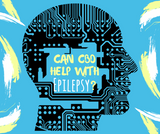You have probably heard both terms anxiety attack and panic attack. You might think they are the same thing, even people who experience them can get the two confused, but they are actually quite different. So what exactly is the difference between an anxiety attack and a panic attack?
What is a Panic Attack

Panic and anxiety have different features, and they are used by a behavioral health professional as terms for specific symptoms and disorders. Panic attacks have similar symptoms that can make them seem like an anxiety attack like:
- Rapid Heartbeat
- Shortness of Breath
- Dizziness
- High-Stress Levels
- Excessive Worrying
The difference in a panic attack is that it is often a sudden fear or anxiety felt that starts to take over. This feeling is intense and can turn into terror, nervousness, or apprehension. The symptoms are so severe; they are the only thing you can focus on in the moment of an attack. They usually occur seemingly for no reason, without an obvious immediate trigger. However, they can become expected because the fear is caused by a stressor like a phobia. Panic attacks don’t usually last for very long. After about ten minutes, the symptoms usually calm down but some attacks can last longer, or some people can have several attacks one after the other.
People who have panic disorders are often vulnerable to panic attacks. However, you can experience a panic attack without a mental health disorder. Panic attacks and anxiety are a normal and emotional protective response that our body uses as an alarm bell to get us to safety. When these attacks or anxiety happen too frequently and start to get in the way of someone’s quality of life, that is when these become a problem.
There is a guide that health professionals use called the DSM-5 which has lists of symptoms to categorize mental health disorders. In order for an attack to be categorized as a panic attack, it must have four or more of the following symptoms:
- Excessive Sweating
- Heart Palpitations
- Trembling or Shaking
- Dizziness or Faintness
- Chest pain or Discomfort
- Difficulty Breathing
- Nausea or Abdominal Discomfort
- Chills or Hot Flashes
- Anxiety
- Fear of Dying
- Depersonalization or Derealization
- Feeling like you are Choking
- Fear of Losing Control
What is an Anxiety Attack

The DSM doesn’t define the term anxiety attack. Instead, they use anxiety as a term to describe a core feature of several illnesses under the category of anxiety disorders, obsessive-compulsive disorders, and trauma and stress-related disorders. When it comes to anxiety, the feelings of fear and tension usually get worse over time and are associated with excessive worry about a potential danger, whether it exists or not. When this feeling of anticipation builds up, and the level of stress reaches a point of being overwhelming, it can feel like an attack.
Symptoms of Anxiety May Include:
- Muscle tension
- Disturbed sleep
- Difficulty concentrating
- Fatigue
- Restlessness
- Irritability
- Increased startle response
- Increased heart rate
- Shortness of breath
- Dizziness
The biggest difference between panic attacks and anxiety attacks is that panic attacks are usually a lot more intense, but the symptoms don’t last as long as an anxiety attack would. Anxiety attacks can last for days, weeks, or even months. Both types of attacks are serious and need to be addressed once you start noticing these symptoms. Anxiety is %100 treatable through therapy, and CBD oil can make the journey toward recovery a lot easier. Check out how CBD oil can help with anxiety and how it can help with panic attacks and then talk to your doctor about using CBD oil to help calm your brain down while you learn how to manage your stress levels.















